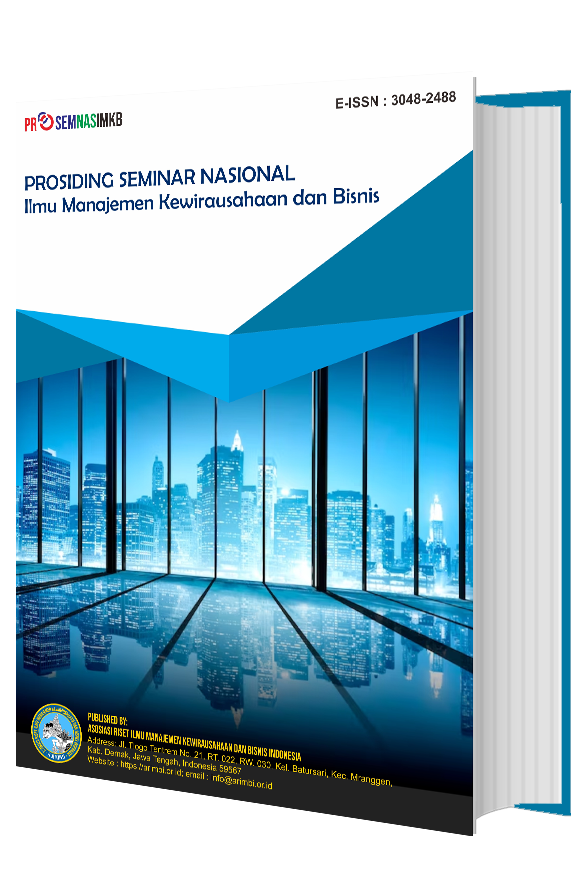Literasi Digital Investor Ritel di Era Disrupsi: Navigasi Keuangan Pribadi dan Pasar Modal Menuju Society 5.0 yang Berkelanjutan
DOI:
https://doi.org/10.61132/prosemnasimkb.v2i2.201Keywords:
digital literacy, retail investors, capital markets, Society 5.0, sustainable investmentAbstract
The era of digital disruption has brought significant changes to people's behavior, including investment activities. Retail investors have increasingly easy access to the capital market through digital applications such as Neo HOTs, Bibit, and Stockbit. However, this convenience is not always accompanied by adequate digital financial literacy. This study aims to explore retail investors' experiences using digital investment applications and understand their perceptions of sustainable investing in the Society 5.0 era. The research method used a descriptive qualitative approach with in-depth interviews with a number of active retail investors. The findings indicate that the majority of retail investors are attracted to investing due to ease of access and promotions, but many still make impulsive decisions based on social media trends (fear of missing out/FOMO). A small number of investors are beginning to understand the importance of sustainable investing (ESG), although it has not yet become a primary consideration in investment decisions. This study emphasizes the importance of more targeted digital financial literacy so that people can use technology wisely, maintain personal financial sustainability, and contribute to sustainable development.
Downloads
References
Barber, B. M., & Odean, T. (2001). Boys will be boys: Gender, overconfidence, and common stock investment. The Quarterly Journal of Economics, 116(1), 261–292. https://doi.org/10.1162/003355301556400
Bona, C., & Liangga, V. M. (2022). Pengaruh perilaku anchoring dan herding bias terhadap keputusan investasi saham. Ekonomi dan Bisnis: Berkala Publikasi, Gagasan Konseptual, Hasil Penelitian, Kajian, dan Terapan Teori, 26(2), 90–97. https://doi.org/10.24123/jeb.v26i2.5254
Chen, H., & Volpe, R. P. (1998). An analysis of personal financial literacy among college students. Financial Services Review, 7(2), 107–128. https://doi.org/10.1016/S1057-0810(99)80006-7
Dealls. (2025). 12 rekomendasi sekuritas saham terbaik untuk investasi kamu. https://dealls.com/pengembangan-karir/sekuritas-saham-terbaik
Fitra, Y. A. (2023). Pengaruh bias perilaku investor terhadap keputusan investasi di pasar saham. Jurnal Capital, 5(2), 88–98. https://doi.org/10.33747/capital.v5i1.185
Friede, G., Busch, T., & Bassen, A. (2015). ESG and financial performance: Aggregated evidence from more than 2000 empirical studies. Journal of Sustainable Finance & Investment, 5(4), 210–233. https://doi.org/10.1080/20430795.2015.1118917
Fukuyama, M. (2018). Society 5.0: Aiming for a new human-centered society. Japan Spotlight, 47, 47–50.
Hartono, H., Halim, E., Aswieri, A., Suharli, D., & Maurella. (2023). The influence of financial literacy and heuristic behavior on Generation Z's investing decisions during a global pandemic. E3S Web of Conferences, 426, 02008. https://doi.org/10.1051/e3sconf/202342602008
IDX. (n.d.). Indeks saham. IDX.co.id. https://www.idx.co.id/id/produk/indeks
IEC. (2023). Mengenal ESG (Environmental, Social, and Governance). https://environment-indonesia.com/mengenal-esg/
Kahneman, D., & Tversky, A. (1979). Prospect theory: An analysis of decision under risk. Econometrica, 47(2), 263–291. https://doi.org/10.2307/1914185
KEHATI. (n.d.). Indeks SRI-KEHATI. https://kehati.or.id/indeks-sri-kehati/
Miles, M. B., & Huberman, A. M. (1994). Qualitative data analysis: An expanded sourcebook. Sage Publications.
Nurahmad, K. P. (2025, July). Jumlah investor pasar modal tembus 17 juta, investor baru lampaui 2 juta (Press Release No: 0053/BEI.SPR/07-2025). IDX. https://www.idx.co.id/id/berita/siaran-pers/2408
OECD. (2023). International survey of adult financial literacy. OECD Working Papers.
Otoritas Jasa Keuangan. (2022). Survei nasional literasi dan inklusi keuangan. OJK.
P2K STEKOM. (n.d.). Ensiklopedia, Stockbit. https://p2k.stekom.ac.id/ensiklopedia/Stockbit
Pertiwi, A. H., & Panuntun, B. (2023). Pengaruh herding behavior, cognitive bias, dan overconfidence bias terhadap keputusan investasi. Selekta Manajemen: Jurnal Mahasiswa Bisnis & Manajemen, 2(3), 112–129.
Rahman, R. E., & Ermawati. (2019). Analisis herding behavior di pasar saham: Studi kasus ASEAN-5+US. Bank Indonesia: Working Paper.
Sekaran, U., & Bougie, R. (2010). Research methods for business: A skill-building approach (5th ed.). John Wiley & Sons.
Downloads
Published
How to Cite
Issue
Section
License
Copyright (c) 2025 Prosiding Seminar Nasional Ilmu Manajemen Kewirausahaan dan Bisnis

This work is licensed under a Creative Commons Attribution-ShareAlike 4.0 International License.






